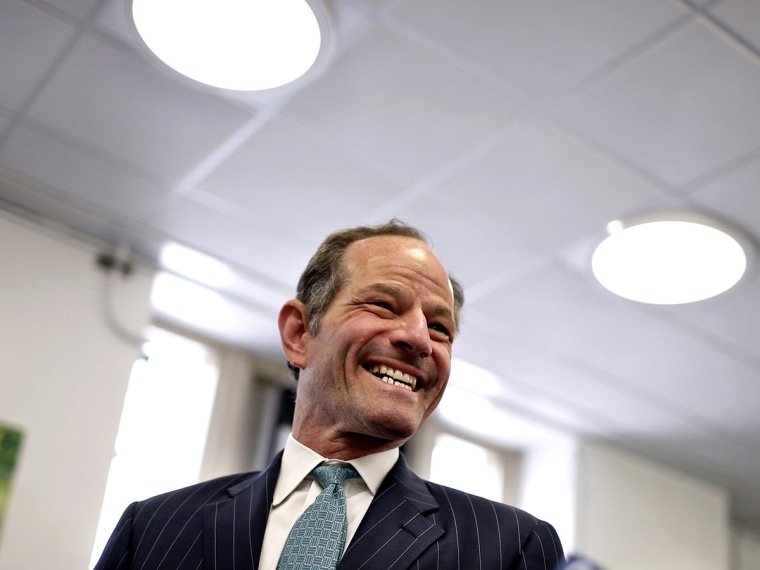First it was disgraced former congressman Anthony Weiner who re-entered New York's political fray, claiming he was a changed man seeking forgiveness. And for a while, his chances of redemption seemed almost possible: The Democrat managed to lead a crowded candidate field in a bid for city mayor. But whispers of a comeback crashed and burned amid revelations that the self-proclaimed "changed man" remained tarnished for the same reasons that got him in trouble in the first place.
Later it was Eliot Spitzer, the disgraced former New York governor, who thought he would "do something positive" after he resigned in shame over his involvement in a high-end prostitution ring. Spitzer said he was ready to take his tough-on-Wall Street reputation to a position that holds little fanfare: leading the New York City comptroller's office. And polls originally suggested that a majority of Democrats were willing to support the former governor who spent 10 times the amount on his campaign over his rival.
But New York City voters on Tuesday cut short both men's redemption tours, offering instead a resounding rejection to any political comeback. Weiner received a humiliating 5% of the votes in the Democratic mayoral primary, finishing in fifth place. Spitzer ultimately lost 52-48% in the comptroller race to Manhattan Borough President Scott Stringer—a relatively unknown name outside of the city compared to Spitzer.
"We have the best ideas. Sadly, I was an imperfect messenger," Weiner said during his concession speech Monday night.
Weiner's and Spitzer's stories were just part of the comeback narrative painted over 2013 after former South Carolina Gov. Mark Sanford, who famously lied about his whereabouts in 2009 while visiting his mistress in Argentina, won a special election congressional race in May. Alongside Sanford in the "comeback kid" ring is Louisiana Sen. David Vitter, who was caught in the 2007 D.C. Madam scandal before eventually succeeding in a 2010 re-election bid. Vitter's name is currently being tossed around as a possible Louisiana gubernatorial nominee in 2015.
But Sanford and Vitter had something that neither Weiner nor Spitzer had in their races: Support from their party.
"The difference," Democratic strategist and MSNBC contributor Jimmy Williams said, "is that the South Carolina leadership came out in support for [Sanford]." Current South Carolina Gov. Nikki Haley appeared alongside Sanford at fundraisers and publicly threw her support behind her predecessor, as did Sens. Lindsey Graham and Tim Scott.
"But did Bloomberg come out in support? Did Chuck Schumer? Kirsten Gillibrand?" Williams asked of New York's prominent lawmakers.
The silence from the left as Weiner and Spitzer attempted public redemption is unsurprising. Scandals are not new to New York politics—particularly Democrats, as WNET noted earlier this spring—and the national attention on Weiner and Spitzer only served as a distraction in many Democratic leaders' eyes. Current New York City Mayor Michael Bloomberg in April scolded reporters for focusing on Weiner's past, but later punted on questions after Weiner's inappropriate exchange of messages online with a young woman under the pseudonym "Carlos Danger" made problematic headlines. Schumer, who once mentored Weiner, stayed quiet about the mayoral race, as did Gillibrand, who only offered a brief endorsement for Stringer in July.
As for those voters who were willing, at first, to grant that second chance to Weiner and Spitzer? Williams said the public isn't stupid. "The public has a smell test. It's one thing to smell something that's gone bad, it's another to realize that smell is still coming from your house and it keeps smelling bad."
And neither Weiner nor Spitzer gave the public the opportunity to come back around: Spitzer appeared on Hardball in July where he sharply criticized Weiner's campaign, and Weiner continued to engage in high-profile interviews that only furthered the distraction.
"They should have taken a page from the Vitter and Sanford playbook: admit your problems, and then shut up and leave the stage," Williams suggested. "That gives you more bang for your buck than being on TV 24/7."
